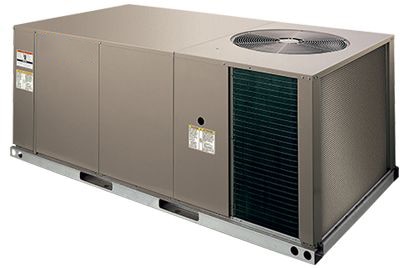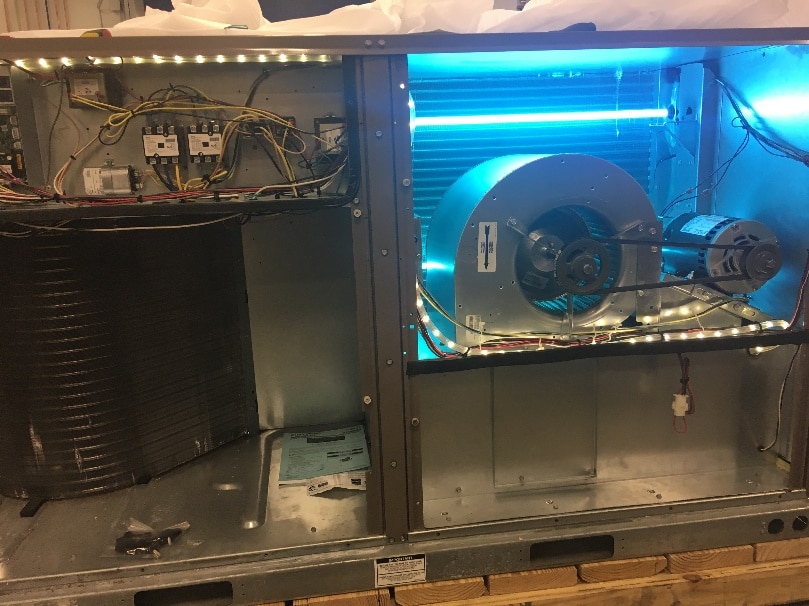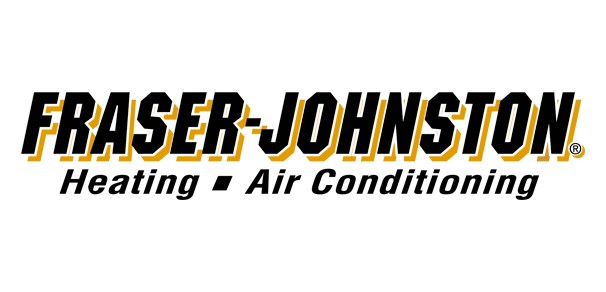The Importance of IAQ
Ducted Systems Package Units COVID + Seasonal Flu Impacts
As we move through the pandemic years, HVAC professional must continue the hard work to minimize the spread of airborne infectious diseases. The vast majority of commercial buildings use package units to condition the spaces.
When using package equipment, what should HVAC professionals select, specify, and install to reduce COVID and Flu in buildings?

Ventilate
Commercial buildings should receive proper amounts of outside air to reduce the concentration of indoor air containments. Simply stated, we need to replace the stale indoor air with clean fresh air. Good HVAC practices recommends a minimum of four air changes per hour (ACH) for commercial buildings. An ACH rate of four simply means that the entire air volume in the space will be replaced by the HVAC system every 15 minutes. In addition, good HVAC practices also recommend 6-8 ACH for densely populated areas such as classrooms and restaurants to reduce the time downward to every 7.5 minutes.
Ventilation Tips
-
Install and maintain RTU economizers. Good industry practice recommends the energy savings use of “free cool” during mild weather times. When the space requires cooling, the RTU allows the colder outdoor air to cool the space rather than turning on the compressors. The use of fresh air inherently allows for 100% replacement of the zone air for each ACH cycle! Think – every 15 minutes the entire building air is replaced with fresh outdoor air!
-
Implement Econ + Mech economizer operation. Sometimes the outdoor air is easier to condition than the return air from the space. The RTU control system can choose to condition the warm outdoor air for delivery to the space then the RTU can expel the hot indoor space air to the outdoors. This mode increases the economizer use time, thereby, improving indoor air quality while continuing to reduce energy. California Title 24 and ASHRAE standards encourage this mode of operation. Luxaire® RTUs, unlike other competitors’ units, offers the sequence as a standard control setting.
-
Use the ON DEMAND PURGE sequence available on Luxaire® smart equipment control (SEC) boards. The RTU control boards allow user-installed switches to command the units to blow in the space 100% outdoor air upon switch activation for 15 minutes. It is similar to opening a window from time to time to quickly “freshen” the indoor space. This is ideal for denser populated spaces where a person sneezing, or coughing may make others uncomfortable. The switch should be installed where personnel can easily activate the mode as necessary.
-
Avoid intermittent supply fan control. For commercial applications, the supply fan should run continuously in the occupied mode to maintain proper air change rates.
Clean the Air
Most infectious diseases catch a ride on floating air particles such as room dust to become airborne. As the “aerosol” dust travels around the room, so does the now “aerosol” infectious disease. To minimize the airborne virus, the HVAC system must remove the dust. In doing so, the human sneeze particles land on the floor instead of hitching a ride around the building. Good HVAC practice should remove the floating dust particles within 15 minutes.
Clean Air Tips
-
Replace or clean HVAC air filters regularly. Fraser-Johnston rooftop units -Relia™ Pro, Relia™ Choice, and Relia™ Select - offer air filter status options to help remind the building staff to replace the filters.
-
Upgrade filters where possible to MERV 13 rated filters. Infectious diseases can cling to very small dust particles (0.3 microns) that pass through the standard MERV 8 filters found in most units. MERV 13 filters ensure that greater than 50% of the ultra-small particles are captured while reaching 95% rates for large specs of dust (>0.5 µm). Infectious diseases, once captured in a filter bank, will become inactive within a day.
-
Install Ultraviolet light (UVC) in the HVAC system. Infectious diseases exposed to intense UVC light will become inactive in fractions of a second! The light intensity should be no less than 1500 located downstream of the evaporator coil in the HVAC system. Fraser-Johnston packaged units use three times more light intensity to achieve 99% single pass deactivation rates. Fraser-Johnston Relia Choice, Relia Pro, and Relia Core rooftops offer UVC lights at standard intensity levels providing greater than 90% deactivation rates.

Control Space Temperature and Humidity
There is evidence that excessive low or high space humidity can increase the transmission rate of viruses and bacteria. Therefore, the HVAC industry recommends a space-relative humidity setpoint between 40-60%. Operating the packaged unit to maintain standard space temperature and humidity also helps ensure the HVAC equipment itself does not become contaminated or a source of biological hazardous such as Legionella pneumophila or the spread of COVID. Avoid installing package units in extreme applications where the unit is unable to control the environment. Click on the link Infectious Disease Response for Commercial Ducted HVAC Systems - White Paper for more details.
